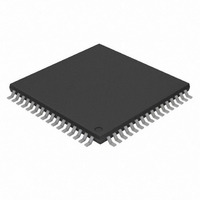PIC18F64J90-I/PT Microchip Technology, PIC18F64J90-I/PT Datasheet - Page 402

PIC18F64J90-I/PT
Manufacturer Part Number
PIC18F64J90-I/PT
Description
Microcontroller
Manufacturer
Microchip Technology
Series
PIC® 18Fr
Datasheets
1.PIC16F616T-ISL.pdf
(8 pages)
2.PIC18F63J11-IPT.pdf
(36 pages)
3.PIC18F63J90-IPT.pdf
(416 pages)
4.PIC18F63J90-IPT.pdf
(22 pages)
5.PIC18F63J90-IPT.pdf
(4 pages)
6.PIC18F63J90-IPT.pdf
(6 pages)
7.PIC18F63J90-IPT.pdf
(6 pages)
8.PIC18F63J90-IPT.pdf
(12 pages)
Specifications of PIC18F64J90-I/PT
Core Processor
PIC
Core Size
8-Bit
Speed
40MHz
Connectivity
I²C, SPI, UART/USART
Peripherals
Brown-out Detect/Reset, LCD, LVD, POR, PWM, WDT
Number Of I /o
51
Program Memory Size
16KB (8K x 16)
Program Memory Type
FLASH
Ram Size
1K x 8
Voltage - Supply (vcc/vdd)
2 V ~ 3.6 V
Data Converters
A/D 12x10b
Oscillator Type
Internal
Operating Temperature
-40°C ~ 85°C
Package / Case
64-TFQFP
Lead Free Status / RoHS Status
Lead free / RoHS Compliant
For Use With
AC162079 - HEADER MPLAB ICD2 18F85J90 64/80AC164327 - MODULE SKT FOR 64TQFP
Eeprom Size
-
Lead Free Status / RoHS Status
Lead free / RoHS Compliant, Lead free / RoHS Compliant
Available stocks
Company
Part Number
Manufacturer
Quantity
Price
Company:
Part Number:
PIC18F64J90-I/PT
Manufacturer:
Microchip Technology
Quantity:
10 000
- PIC16F616T-ISL PDF datasheet
- PIC18F63J11-IPT PDF datasheet #2
- PIC18F63J90-IPT PDF datasheet #3
- PIC18F63J90-IPT PDF datasheet #4
- PIC18F63J90-IPT PDF datasheet #5
- PIC18F63J90-IPT PDF datasheet #6
- PIC18F63J90-IPT PDF datasheet #7
- PIC18F63J90-IPT PDF datasheet #8
- Current page: 402 of 416
- Download datasheet (4Mb)
PIC18F85J90 FAMILY
B.4
Besides the LCD pinout differences already described,
there are other differences in the pinouts between the
PIC18F85J90 and the PIC18F8490 families:
• Input voltage tolerance
• Output current capabilities
• Available I/O
Pins on the PIC18F85J90 that have digital only input
capability will tolerate voltages up to 5.5V, and are thus,
tolerant to voltages above V
Section 10.1 “I/O Port Pin Capabilities” contains the
complete list.
In addition to input differences, there are output differ-
ences as well. PIC18F85J90 devices have three
classes of pin output current capability: high, medium
and low. Not all I/O pins can source or sink equal levels
of current. Only PORTB and PORTC support the
25 mA source/sink capability that is supported by all
output pins on the PIC18F8490. Table 10-1 in
Section 10.1 “I/O Port Pin Capabilities” contains the
complete list of output capabilities.
Finally,
EUSART/AUSART and SPI peripherals can be config-
ured by the user as open-drain outputs. This allows for
simpler interfacing with external devices operating at
higher voltages. This capability is not directly
equivalent to any feature on the PIC18F8490 family.
There are also differences in the implementation of
some ports on PIC18F85J90 devices. While the total
number of general purpose I/O pins are very similar
(67 vs. 66), the implementation of individual pins has
notable differences:
• The MCLR pin is dedicated only to MCLR and
• RF0 does not exist on PIC18F85J90 devices.
• RE0, RE1 and RE3 are implemented on
All of these pin differences (including power pin
differences) should be accounted for when making a
conversion between PIC18F8490 and PIC18F85J90
devices.
DS39770C-page 402
cannot be configured as an input (RG5) as it can
on PIC18F8490 devices.
PIC18F85J90 devices, but not PIC18F8490
devices.
Pin Differences
the
pins
associated
DD
with
. Table 10-1 in
the
CCP,
B.5
Peripherals must also be considered when making a
conversion between the PIC18F85J90 and the
PIC18F8490 families:
• A/D Converter: The converter for PIC18F85J90
• Data EEPROM: PIC18F85J90 devices do not
• BOR: PIC18F85J90 devices do not have a
• LVD: PIC18F85J90 devices do not have this
devices require a calibration step prior to normal
operation.
have this module but offer self-programming
capability.
programmable BOR. Simple brown-out capability
is provided through the use of the internal voltage
regulator.
module. A limited, fixed setpoint capability is
provided through the use of the internal voltage
regulator.
Other Peripherals
2010 Microchip Technology Inc.
Related parts for PIC18F64J90-I/PT
Image
Part Number
Description
Manufacturer
Datasheet
Request
R

Part Number:
Description:
Manufacturer:
Microchip Technology Inc.
Datasheet:

Part Number:
Description:
Manufacturer:
Microchip Technology Inc.
Datasheet:

Part Number:
Description:
Manufacturer:
Microchip Technology Inc.
Datasheet:

Part Number:
Description:
Manufacturer:
Microchip Technology Inc.
Datasheet:

Part Number:
Description:
Manufacturer:
Microchip Technology Inc.
Datasheet:

Part Number:
Description:
Manufacturer:
Microchip Technology Inc.
Datasheet:

Part Number:
Description:
Manufacturer:
Microchip Technology Inc.
Datasheet:

Part Number:
Description:
Manufacturer:
Microchip Technology Inc.
Datasheet:











